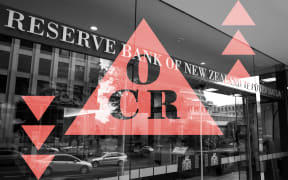
Photo: RNZ / Marika Khabazi
Households and business will be paying high interest rates for longer, as a result of the OCR remaining unchanged, ANZ bank chief economist Sharon Zollner says.
The Reserve Bank kept the OCR at 5.5 percent and issued a less aggressive statement.
She was the one forecaster to predict a quarter percentage point rate rise and said her call was completely wrong.
Zollner told Checkpoint she was "very happy for mortgage holders".
"As long as the Reserve Bank turns out to be right with this decision, there's always that conditionality.
"Our suspicion is that, we're seeing in that bunch of data, that inflation is showing signs of levelling out too high, so the risk is that rates could end up going higher for longer later, but certainly here and now there'll be relief for mortgage owners that rates are not going higher."
The RBNZ sounded much more relaxed today than in November, she said. And now it had backed down from a hike.
Markets had priced out any chance of a hike this year, instead pricing two cuts, Zollner said.
"Expectations of the market are as important as the actual OCR decision in terms of mortgage rates, because most people are on fixed mortgage rates, so that fall in wholesale rates is actually resulting in quite an easing and monetary conditions. And the Reserve Bank would have known that would happen, so presumably they're comfortable with that."

ANZ bank chief economist Sharon Zollner. Photo: RNZ / DOM THOMAS
She said it was surprising that the RBNZ said that "the fallen tradable inflation was a bit bigger than they thought and that sort of offsets the surprise on domestic inflation".
"The issue there is that the domestic inflation tends to be the really sticky bit and the slow-moving bit and the bit that the Reserve Bank can actually do something about. So we thought they would focus much more on the fact that that was falling much more slowly than they anticipated, whereas they kind of said, 'Oh well, win some, lose some, we're all good'."
She said market expectations were also influenced by activity in the US.
That resulted in a lot of movement in wholesale rates, more recently it had been upwards, but overall rates had been lower than they were and had been, she said.
"That explains the downward pressure we've seen on mortgage rates. Our take was that the Reserve Bank wouldn't want rates to fall any further, but we were clearly wrong.
"So people involved in the housing market will be pleased about that."
High rates to continue
She said banks dropping interest rates was in the distant future, with some suggesting 2026.
While ANZ had removed hikes from its forecast, she said the bank was pushing out cuts longer.
"The Reserve Bank still has a big job to do, getting inflation down, and if they're not going to do it with higher rates, they'll have to do it with high rates for longer.
"That said, they actually brought their estimates, cuts forward a little bit. But it's still forever away. And this is a global theme, central banks pushing back against markets that want to believe cuts are coming soon."
She said wholesale rates fell today even though the OCR remained unchanged.
While that affects the floating mortgage rate, "what matters for those on fixed rates is the expectations of where the OCR is going, and those took a step lower today".
"It all depends on how long you've been fixed for. If you've been fixed for a very, very long time, you're probably still going to be rolling over onto a higher rate, but a lower rate than it would have been if the Reserve Bank hadn't said what they said today. So win some, lose some."
RBNZ appears comfortable
ASB chief economist Nick Tuffley said the central bank's tone "wasn't as hawkish as it could have been".
"The OCR track still implies some chance of an OCR hike over the remainder of 2024, and is consistent with OCR cuts from around [the second quarter of] 2025," he said.
"We continue to expect the RBNZ will cut the OCR in November, with the risks to that view appearing more balanced now that the RBNZ has signalled some degree of comfort with very conflicting signals in the key data out over the recent months."
Westpac chief economist Kelly Eckhold felt the overall tone of the statement was "somewhat hawkish" but less than what the market was fearing.
"Even though the OCR was left unchanged this time, the RBNZ still sees a risk of a need for a higher OCR to 5.75 percent in [the third quarter of] this year," Eckhold said.
"The RBNZ's updated OCR track was lowered, implying around a 40 percent chance of a further OCR increase," he said.
Eckhold said the RBNZ appeared "comfortable" with their strategy "for now".
"Still sticky non-tradables inflation and a slowly adjusting labour market is keeping the RBNZ on their toes. Hence the RBNZ continues to see some risk of a further OCR increase in the next few months."




